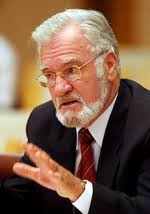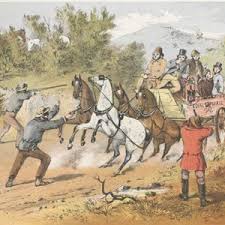Looking at this young woman Greta Thunberg, her face contorted with rage, one has to ask what is the next step?
Rosa Luxemburg’s comment may be relevant and somewhat re-assuring:
The most revolutionary thing one can do is always to proclaim loudly what is happening.
Yet what happened to Rosa Luxemburg, who is one of my admired people, as is Dietrich Bonhoffer? She was killed by the Freicorps in 1919, as was Bonhoeffer – hanged by the sons of the Friekorps at Flossenburg in 1945. They both spoke their mind. They challenged the equivalent to today’s violent alt-right. Both had a form of courage, I wonder whether I could ever emulate; probably not.
But back to Thunberg. What is her next step? She has confronted her Armageddon in a unique way. Yet her following may yet be ephemeral. How many of those who demonstrated last week believe that when the Sun rises tomorrow it will incinerate our Planet in a cloud of carbon dioxide.
Greta Thunberg, in her speech, was full of venom. She is confronting a world that is full of hatred stirred up by the newly-minted demagogues. She is no longer a schoolgirl; to these demagogues she is a revolutionary – a dangerous person. Sweden has a history of assassination. Remember Olof Palme. His killer has never been caught. I do hope Greta has good security.
The Man of Coal gets a Shiny Coating
The Prime Minister has come out of his visit to the United States with a new moniker – a Man of Titanium.

Whether that sticks depends on whether the various spin doctors see any value in ridicule or defence emphasising the properties of titanium. Who knows? However, what else? Maybe some trivial contribution to Trump’s Mars Venture, a couple of speeches, opening a Pratt factory in Ohio in front of what looked liked a bikie convention. Wandering around the United States Morrison, despite all the flattery and pomp, presented a marginalised world figure.
Meanwhile, as well as the speech at the UN climate summit, Jacinda Ardern has given a headline speech at the UN Secretary General’s climate action summit private sector forum. She has been pushing her initiative, the Christchurch call to block extremism on the social media outlet; she has met with Sheryl Sandberg, COO of Facebook, Susan Wojcicki, CEO of YouTube and Brad Smith, president of Microsoft.
Her aim was to cement the Christchurch Call, during a roundtable with the tech companies including Microsoft, Google/Youtube, Amazon, Twitter and Facebook. Maybe the call will become an echo, but in our terms with the new crisis response protocol and the preparedness of Google to test it later this year, she’s giving it a red hot go – and what’s more, she is very relevant to what is occurring in the world.
She may not have been able to feast on Dover sole and apple charlotte with such luminaries as the Honorable Rudy Giuliani or the Honorable Katherine Henderson the other night, but Trump wanted to speak to her and it should be noted that Trump suddenly made time to drop by the Climate Summit – no show without Punch.
By contrast, our Prime Minister didn’t entrance everybody with his talk to the United Nations this week.
However, Morrison is not the tosser that some like to portray. I was thinking about what his next move with Ms Liu will be now that he has the Chinese well offside, and there seems to be some pushback by the Victorian Liberals.
Looking though the guest list for his dinner with Trump there was no Arthur Sinodinos – maybe a bit odd. But when the Niblick from North Shore who was at the dinner, comes home, he will be replaced by an envoy not tarnished by a Trump association; hopefully Sinodinos will be somebody who will be amenable to the Democrats. Just an errant thought chipped out of a cranial bunker.
Stop mucking about
One of the problems the health system faces is how to manage the aged person when their chronic condition develops into an impairment that requires varying levels of ongoing care, particularly institutional care. The health care system is faced with paying for custodial care – and preferably not in high-cost, state-managed acute hospital beds.
To the central Commonwealth agencies the imperative is to keep the aged brain and limbs working, for the forecast is that unless this is done there will not be enough people working to sustain the economy without extensive immigration.
This imperative to keep us working is an ironic outcome, given that the Commonwealth allowed the development of a superannuation scheme that required its own employees to retire on the eve of their 55th birthday. Under the terms of the scheme it was not worth working beyond that age. Moreover, there were financial penalties if you did.
That scheme has been retired, along with a lot of 55 year old public servants, but it illustrates a shift in thinking. It is not that long ago that the futurist chatter was about an increase in leisure time and the expectation of retiring to a recreational middle age. Given the imminent workforce problems, that is not an option for government planners. Therefore the workforce has to be healthy if it is to prolong its usefulness. After all, healthy life expectation starts from intra-uterine life.
The fact is that we have the technology to prolong existence. Whether that existence translates into the kind of life a person would care to be encased is a matter of personal value judgment. To many, though, the primacy of the individual is a societal norm.
So what about this question of an aged care health benefit under Medicare? The Commonwealth already has the power to legislate for a sickness benefit. Also, the Constitution picks out, in addition to the doctors and dentists, benefits for hospital care and pharmaceuticals.
In all the discussions of the Commonwealth’s powers, it was only the passage of the 1946 amendment that enabled the Commonwealth to intervene directly in health financing.
It then created successively the Pharmaceutical Benefits Scheme (1950), the Pensioner Medical Service (1951), the Hospital Benefits Scheme (1952) and finally the Medical Benefits Scheme (1953).
It might be argued that the Pensioner Medical Service was an embryonic attempt at an Aged Health Benefits Scheme. But it was a very limited attempt, restricted to some services provided by general practitioners to eligible pensioners and their dependants.
The matter of Commonwealth powers is relation to health was one of the terms of reference in the first major review of the Constitution established in 1927.
In its report two years later the Royal Commission, which undertook the review, revealed a strong difference of opinion on where responsibility should lie. The majority view supported a “softly, softly” approach, which would have health as a Commonwealth power but well fettered by the states and even local government.
What emerged strongly in the report was a recognition of the strong sense of co-operation between the Commonwealth and the States. But here the discussion was about quarantine and the promotion of public health. The fact that co-operation had failed under the “stress of epidemics” of smallpox in 1913, influenza in 1919, and plague in 1921, was seen by the Royal Commission as the reason for even more co-operation between the various governments, not less!
In fact, the Commonwealth Department of Health was created as a result of the influenza epidemic and problems arising from the return of large numbers of troops from the First World War. From the national approach to episodes, such as Severe Acute Respiratory Syndrome (SARS) and the Swine Flu epidemic are evidence that co-operation in this area has continued to the present.
But health financing is another matter. It is interesting to note that when the Constitution was next comprehensively reviewed in 1959, health was not mentioned in the deliberations. The Constitutional amendments of 1946 had resulted in the changes welcomed when the world was experiencing the advent of the “wonder drug” era. The cost of the health system was not a political issue.
So what has happened since?

As the late John Deeble, one of the architects of first the Medibank scheme of universal care (1974) and then Medicare (1983), identified over 30 years ago, from 1972 onwards the average wage level of public hospital employees started to rise far faster than both average weekly earnings and medical practitioner incomes. The impetus for this was, in his words, “a compulsory arbitration system which takes almost no account of the ability to pay and was completely unaffected by financing arrangements”.
A number of strategies have been employed to try to contain the cost of the health system since this trend became very apparent in the early 1980s. But in the end, when the smoke clears from any round of Commonwealth-State conversations on health, the problems foreshadowed in tailoring a health care system to projected demographic changes will persist. Yet near the end of the Howard era, there was an explosion of Medicare benefits, expansion of the Medicare Safety Net and the reintroduction of the private health insurance rebate.

One wonders, then, whether it would be best if there were some consolidation of the power of the Commonwealth, such that it assumed complete control of aged health care and, by implication, total control of health. Alternatively, should the Commonwealth simply retire from health care? This debate has achieved currency periodically, although with the number of reviews, which have been entered into from Rudd to Morrison, the debate has become rather muted waiting for the deliberations of these committees. The time that the Robinson Review has been allowed to meander needs to be curtailed as I mentioned before; and who knows where the Royal Commission into Aged Care Quality and Safety, constituted at the beginning of the year and due to release an interim report at the end of October, will end up.
There remains a need to stimulate discussion on how best to address the issue of providing for an aged health care benefit.
At first blush, advocacy of such a benefit would appear to be for “health care” after age 65. Any person, whether in the guise of “patient”, “client” or just plain “consumer”, would have the discretion to use that government-funded benefit how he or she thinks fit.
Such a libertarian solution is immediately hedged with all the provisos that abound in that “dark and pessimistic world we inhabit” – a state of affairs we might expect if we listen to those who try to ensure that any freedom of action is hung on a line of conditional discretion for our own protection.
This is the dilemma: the tug-of-war between freedom to do what you want and the imposition of the fiat of “what is good for you”.
And so the level of knowledge about the various courses of action that are available becomes crucial when determining the outcome of this tug-of-war in relation to the individual complaint.
It is the power of asymmetric knowledge. The provider has knowledge, which the consumer generally does not.
Constitutionally, the Commonwealth may have the power to establish an aged care benefit which could, for instance, be just a redefinition of the power to set “sickness benefits” (which is mentioned in the 1946 amendment).
The fact that so few referenda are passed is testament to the conservatism of the electorate. But it also indicates that the same electorate takes change seriously.
There have been four referenda since the one in 1946. The consequences? Aboriginal people have been given the right to vote; price and income control has not been conceded to the Commonwealth Government; and the Republic has been denied. A number of constitutional anomalies were clarified in the 1977 referendum.
The financing of aged health care is another major issue.
The prospect of a referendum will draw out the vested interests, to be tested in the glow of debate. And that is the point! It is the vested interest who may feel that such a debate would not be fruitful because it is too hard to change the system. But in the end it would be academic. Referenda are expensive, and in the current economic climate seen as a luxury; nor would the cession of powers attract much interest.
But if one level of government does not at least have the unequivocal power for health care of the aged then the proposition of a consolidated benefit for aged care will never be tested. The optometric scheme was introduced in 1974, and the sleight of hand used to assure Constitutionality was to deem the optometrist service as “medical”. In any event, the Commonwealth was providing a fixed benefit for a limited range of services. The optometrist had to accept the benefit amount.
This is very different from the medical benefit, where the benefit is the Government’s contribution to the overall medical fee, which remains at the discretion of the doctor. The Commonwealth has progressively tried to cap the Medicare expenditures and at the same time maintain the gap payments at an accepted level; hence the expanded Medicare safety net and bulk billing provisions, which are increasingly working less well and there is a rising concern between benefit and actual fee proceduralists, in particular, charge. Given his craving for publicity maybe it could be called the Teo effect after the cavalier neurosurgeon of the same name.
The language of the majority opinion in the 1929 Royal Commission report still resonates as a challenge to this nation to consolidate the health power in that sense of co-operation, which has been apparent in public health matters since Federation.
So let us play with the theme – directing the whole of our approach to health care, from conception onwards, towards conferring an aged care health benefit – but under a single power conferred by the Constitution. However, if the definition of “sickness benefit” is expanded then it may enable the benefit scheme to be extended to those health professionals that the current language of the Constitution excludes. There is for instance no provision for “a nursing fee for Medicare benefit”, unless you pursue the optometrist option – and I doubt whether either doctor or nurses would be happy that nursing services being deemed “medical” to attract a patient benefit
If that can be done without a referendum, there will be much saving of time and expense. But there is no doubt that referenda and the prospects thereof do focus the collective community mind.
Mouse Whisper
I love the story about an Australian bushranger called Charles Rutherford who was illiterate and lurked around the Lower Darling in the early nineteenth century. When he robbed a coach, he asked the passengers to read out the value of each cheque that he intended taking. Talk about honour among thieves. But there was more. He used to take his captives to a near-by hotel for drinks and lunch at which Rutherford, presided gun in hand.

